To improve your nutrient intake for post-exercise recovery, focus on these key steps. First, prioritize protein sources like lean meats and dairy to assist muscle repair. Include healthy carbohydrates such as whole grains and fruits to replenish energy. Don't forget hydration—aim for 16-24 ounces of water right after exercising. Incorporate healthy fats from avocados and nuts for sustained energy. Timing is critical; eat within 30-60 minutes post-workout for best recovery. Adjust your intake based on your workout intensity, ensuring you meet your body's needs. There's plenty more to explore about proper nutrition for recovery.
Core Insights
- Prioritize consuming protein within 30-60 minutes post-workout to enhance muscle repair and recovery.
- Incorporate healthy carbohydrates like fruits and whole grains to replenish energy stores after exercise.
- Stay hydrated by drinking 16-24 ounces of water immediately after working out, and throughout the day.
- Include healthy fats, such as avocados and nuts, to support muscle repair and reduce inflammation.
- Adjust your nutrient intake based on workout intensity, focusing on higher carbs and protein for high-intensity sessions.
Prioritize Protein Sources
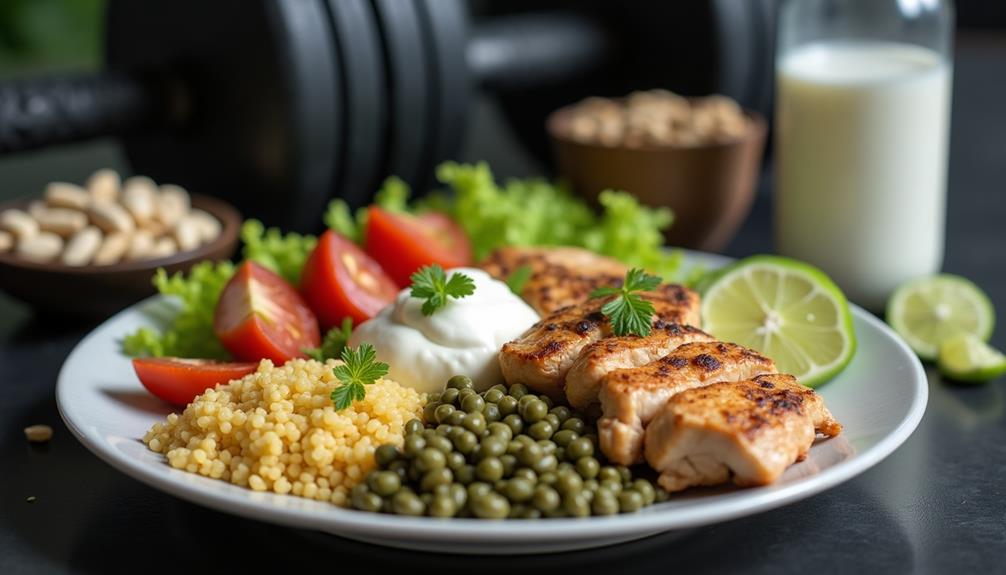
Prioritizing protein sources is vital for effective post-workout recovery. After you finish exercising, your muscles need repair, and protein plays a pivotal role in that process. Aim for high-quality protein sources like lean meats, fish, eggs, dairy, or plant-based options such as beans and lentils. These foods provide the amino acids necessary for muscle repair and growth. For those seeking convenience, whey protein powders can offer 24-25g of protein per serving, with some formulations providing up to 26g. Many of these products are also low in fat and sugar, making them suitable for various dietary needs.
Consider timing your protein intake, too. Consuming protein within 30 to 60 minutes after your workout can maximize recovery benefits. If you're on the go, a protein shake or bar can be a convenient option. Always remember to balance your protein intake throughout the day to support overall recovery and health. By prioritizing protein, you support your body in bouncing back stronger from workouts.
Include Healthy Carbohydrates
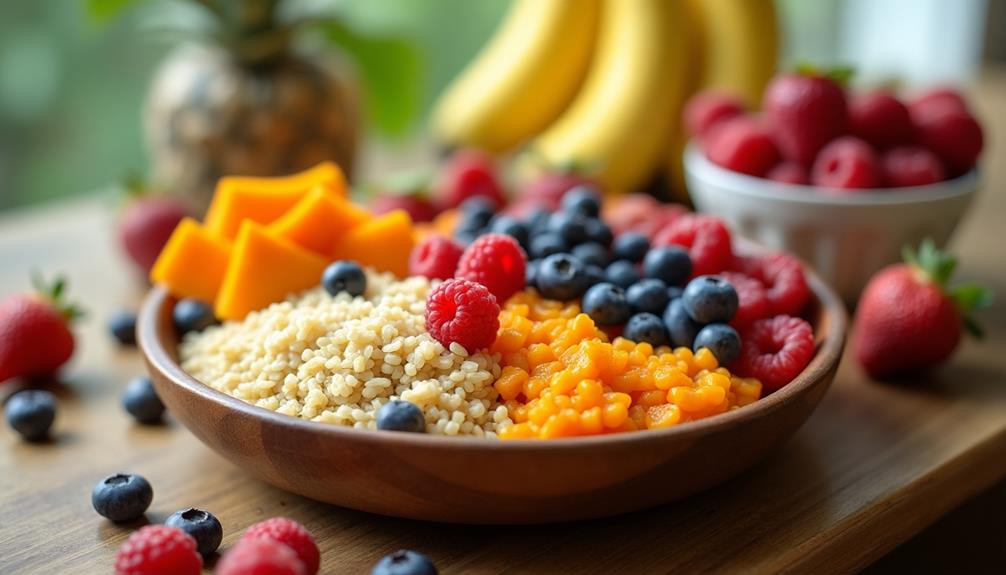
Including nutritious carbohydrates in your post-workout meal is crucial for replenishing energy stores and facilitating recovery. Carbs play a key role in restoring glycogen levels, which are depleted during exercise. Aim for whole grains, fruits, and vegetables, as they provide not only energy but also essential vitamins and minerals. For peak recovery, consider incorporating fast-acting carb powders that are easily digestible and swiftly replenish energy stores. These powders can be particularly advantageous when combined with whole food sources.
Consider options like brown rice, quinoa, or sweet potatoes. Combine these with your protein sources for a well-rounded meal. Don't overlook fruits; bananas and berries are fantastic choices that provide quick-digesting carbs.
Timing is important as well. Try to consume these carbohydrates within 30 to 60 minutes after your workout. This timeframe maximizes recovery and prepares you for your next training session. Prioritizing nutritious carbs will boost your overall performance and recovery process.
Hydrate Effectively

Effective hydration is necessary for maximizing your post-exercise recovery. After a workout, your body loses fluids through sweat, and replacing them is crucial. Start by drinking water as soon as you finish exercising. Aim for at least 16-24 ounces in the first hour.
To enhance your hydration, consider electrolyte-rich drinks, especially if you've had an intense session. These can help replenish lost minerals like sodium and potassium. For peak hydration and performance, look for sugar-free options that provide essential electrolytes without unnecessary calories.
Keep track of your hydration levels throughout the day. A simple way to do this is by monitoring the color of your urine; pale yellow indicates proper hydration.
Lastly, remember that hydration doesn't stop at the gym. Continue to drink water with meals and snacks to maintain the best fluid levels for recovery.
Incorporate Healthy Fats
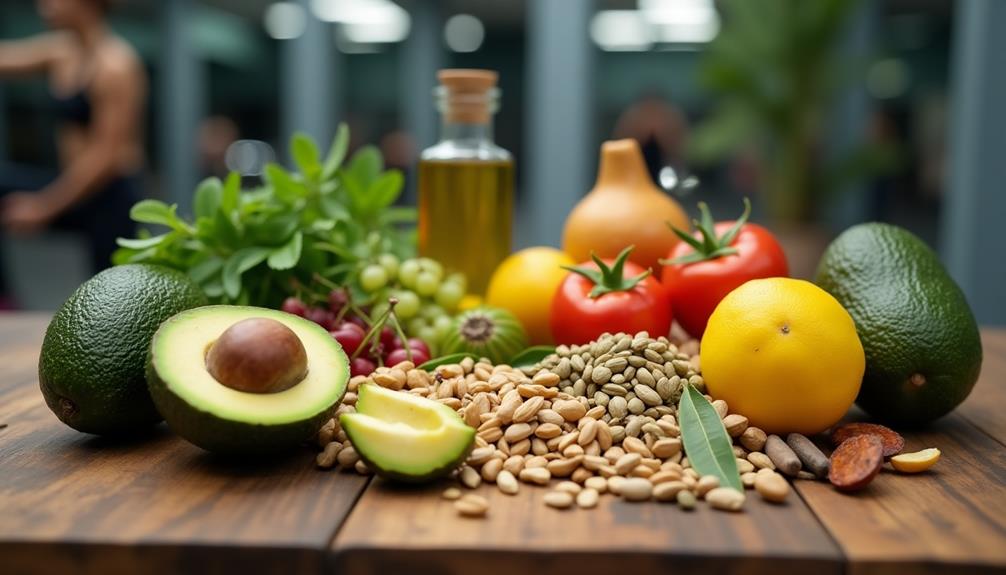
As you focus on post-workout recovery, incorporating healthy fats into your diet can enhance your nutrient intake. Healthy fats play an important role in repairing muscle and reducing inflammation. They also provide long-lasting energy, which is vital after intense workouts. Here are some great sources to keep in mind:
- Avocados: Packed with monounsaturated fats and vitamins, they're perfect for smoothies or salads.
- Nuts and Seeds: Almonds, walnuts, and flaxseeds offer omega-3 fatty acids and protein.
- Olive Oil: A heart-healthy option, it's great for drizzling on veggies or grains.
- Fatty Fish: Salmon and mackerel are rich in omega-3s, supporting muscle recovery.
Including these healthy fats can greatly enhance your overall recovery process.
Timing Your Nutrition

Start with a balanced mix of protein and carbohydrates to help repair muscle tissue and replenish glycogen stores. For instance, a smoothie with protein powder and fruit or a turkey sandwich can be effective.
If you can't eat right away, consider a quick snack, like a protein bar or yogurt. Remember, the sooner you nourish your body, the faster you'll recover. By prioritizing this timing, you'll set yourself up for better performance in your next workout and enhance your overall recovery process.
Focus on Whole Foods
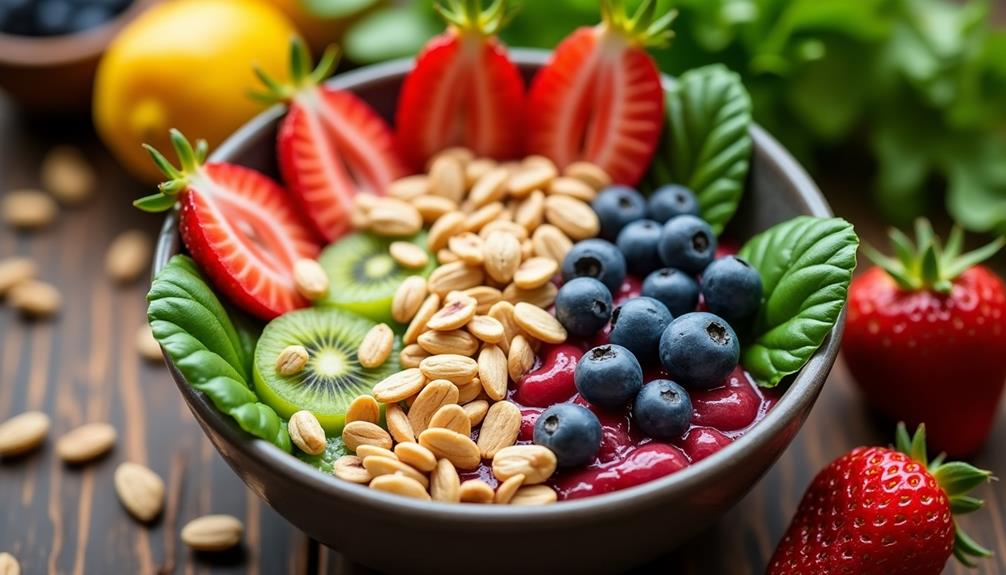
Whole foods are the cornerstone of ideal post-workout recovery. When you focus on whole foods, you provide your body with the essential nutrients it needs to repair and rebuild. These foods are minimally processed, ensuring you get the maximum benefits.
Here are some whole food options to contemplate:
- Lean proteins: Chicken, turkey, or legumes for muscle repair.
- Healthy fats: Avocados or nuts for anti-inflammatory properties.
- Complex carbohydrates: Brown rice or quinoa to replenish glycogen stores.
- Fruits and vegetables: Berries or leafy greens for antioxidants and vitamins.
Incorporating these foods into your post-workout meal helps optimize recovery. You'll feel more energized and ready for your next workout, setting a strong foundation for your fitness journey.
Utilize Recovery Supplements
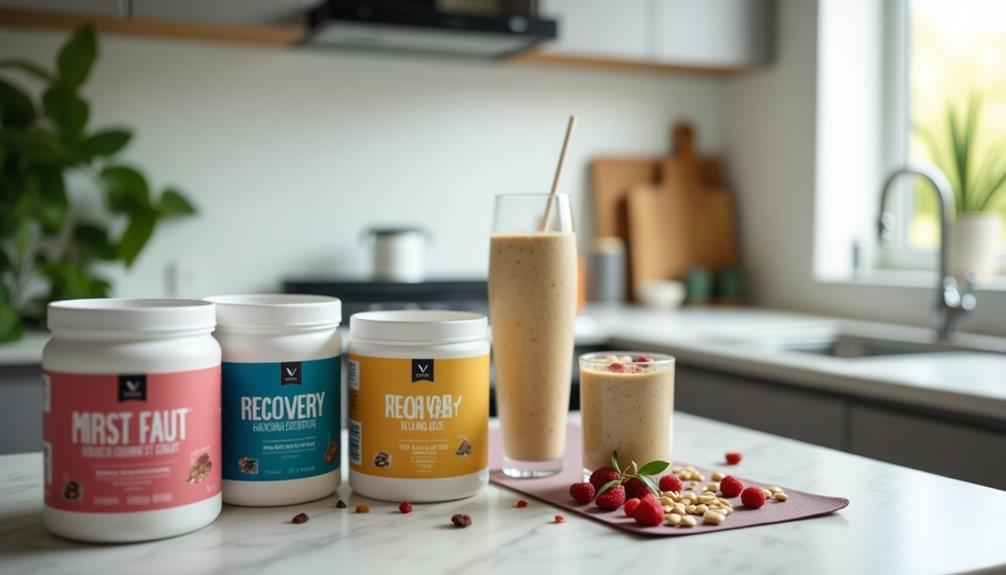
While whole foods provide a solid foundation for post-workout recovery, recovery supplements can enhance your results even further. These supplements can help replenish nutrients lost during exercise and promote muscle repair.
Here's a quick overview of common recovery supplements and their benefits:
| Supplement | Benefits |
|---|---|
| Protein Powder | Aids muscle repair and growth |
| BCAAs | Reduces muscle soreness |
| Creatine | Increases strength and performance |
| Electrolytes | Replenishes lost minerals |
Incorporating these supplements into your post-workout routine can help optimize your recovery. Just remember to choose high-quality products and consult a healthcare professional if you have any concerns. With the right supplements, you'll be on your way to faster recovery and improved performance.
Experiment With Meal Combinations

Experimenting with meal combinations can be a game-changer for your post-workout recovery. By mixing different foods, you can enhance nutrient absorption and fuel your body more effectively. Here are some combinations to try:
- Protein and carbs: Pair grilled chicken with quinoa for a balanced meal.
- Healthy fats and fiber: Combine avocado with whole-grain toast to support recovery.
- Fruits and proteins: Blend a banana with Greek yogurt for a tasty smoothie.
- Vegetables and grains: Toss spinach with brown rice for a nutrient-dense option.
Don't be afraid to mix and match these components. Keeping your meals varied not only helps maintain interest but also guarantees you're getting a wide range of nutrients to support your recovery process.
Monitor Portion Sizes
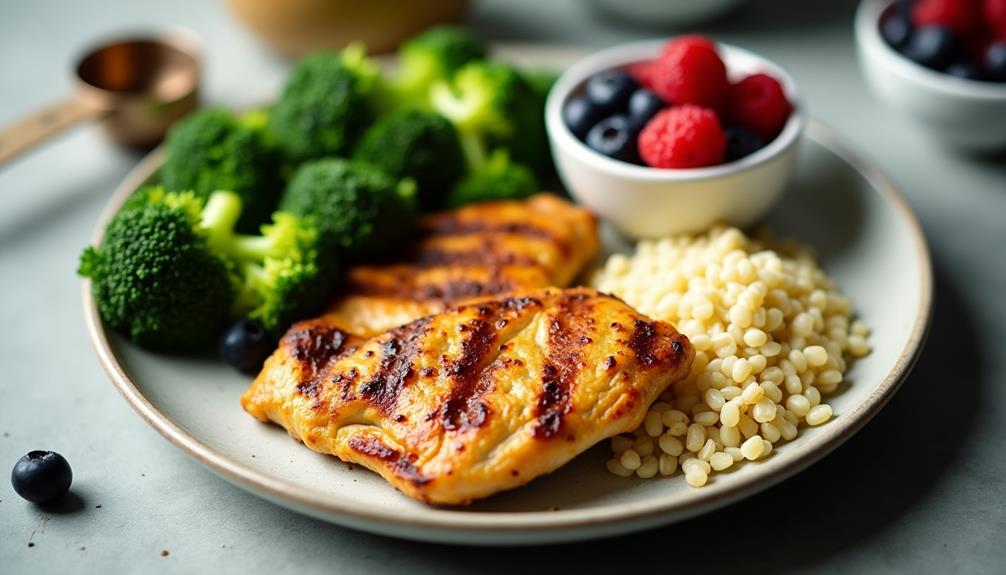
| Food Item | Recommended Portion Size |
|---|---|
| Grilled Chicken | 4-6 ounces |
| Quinoa | 1 cup cooked |
| Broccoli | 1-2 cups cooked |
| Greek Yogurt | 1 cup |
| Almonds | 1 ounce (about 23 nuts) |
Adjust Based on Activity Level

Your nutrient needs can vary greatly depending on your activity level, so adjusting your post-workout recovery meals accordingly is vital. If you're engaging in high-intensity workouts, your body requires more carbohydrates and protein than if you're doing lighter exercises.
Consider these adjustments based on your activity level:
- Low-intensity workouts: Focus on a balanced meal with moderate carbs and protein.
- Moderate-intensity workouts: Increase your carb intake to replenish glycogen stores while maintaining protein.
- High-intensity workouts: Opt for higher carb and protein ratios to support muscle recovery and energy replenishment.
- Endurance training: Incorporate more complex carbs and hydration to sustain prolonged activity.
Frequently Asked Questions
Can I Recover Well With Just Protein Shakes?
You might think protein shakes are magical elixirs, but they can't do it all! While they help, you'll need a balanced diet with carbs and fats too for best recovery. Don't skip the whole food goodness!
What Are the Best Sources of Plant-Based Protein?
When you're looking for the best sources of plant-based protein, consider options like lentils, chickpeas, quinoa, tofu, and edamame. These foods pack a nutritional punch and can easily fit into your meals.
Should I Avoid Sugar Completely After Workouts?
You don't need to avoid sugar completely after workouts. Instead, focus on moderation. Natural sources like fruits can provide quick energy and essential nutrients, helping your body recover without the drawbacks of refined sugars.
Are There Specific Foods That Aid Muscle Recovery?
Imagine feeling your muscles rejuvenate after a workout. Incorporate foods like lean proteins, leafy greens, and whole grains. These nutrient-packed options help you recover faster, boosting your energy and preparing you for your next challenge.
How Does Sleep Affect Nutrient Absorption Post-Workout?
Sleep plays an essential role in nutrient absorption after your workout. When you rest, your body repairs tissues and optimizes the uptake of nutrients, enhancing recovery and muscle growth. Prioritize quality sleep for better results.

